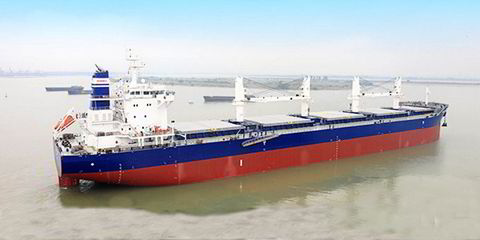When it comes to corporate governance standards in listed shipping companies, size matters, a recently released academic paper shows.
A study by a group of four Greek scholars found bigger boards and bigger companies can protect minority shareholders of listed companies against related-party transactions (RPTs).
“If corporate leaders and regulators want to shield public companies against the transfer of resources to companies that are affiliated with controlling shareholders, they could foster large and independent boards of directors as well as promote large-size companies.”

Rare investigation
Their paper represents a rare attempt to empirically investigate RPTs and conflicts of interest in public maritime companies.
Authors Andreas Andrikopoulos of the University of the Aegean, Anna Merika and Christos Sigalas of the Deree-American College of Greece, as well as maritime economics professor Andreas Merikas of GMS Hellas sifted through financial data of 37 shipping entities listed in the US between 2011 and 2018.
Crunching the numbers, they created variables to gauge the magnitude of RPTs in the industry and then correlated them to measures of profitability, financial leverage, free float and board size.
Several of the paper's findings seem to confirm criticism of the shipping industry that some Wall Street analysts have raised over the years.
A large proportion of the firms in the sample — 31 out of a total 37 — was found to have carried out RPTs.
All companies that did so engaged at some point in transactions with their controlling shareholder, either in his or her role as chief executive or through affiliates. None was found to have such transactions solely with senior managers or executives.

A company in the black is more likely to carry out RPTs, the researchers found, citing a relationship between such deals and a firm’s profitability.
This indicates that “a high level of profitability is a prerequisite for business transactions between public maritime shipping companies and their controlling shareholders’ privately-owned companies”, the researchers said in the paper.
When the transactions do take place, however, future profits are usually dented.
So-called operating RPTs, which are related-party operating expenses as a share of total operating expenses, tend to increase a company's average operating expenses, according to the paper.
“Controlling shareholders can expropriate wealth by ensuring their public company will receive services, or buy supplies and materials, at above-average prices from companies that are affiliated with the controlling shareholders,” the authors said.
Operating RPTs can also provide an alternative route to funnel proceeds to controlling shareholders, especially in financially constrained companies with dividend restrictions, the academics added.
Not so clear-cut
However, the paper also partly vindicates those who argue that related-party transactions can work in a company’s favour.
This is particularly the case with financial RPTs, which are related-party indebtedness as a share of total liabilities. This is a measure of the debt a company receives from entities affiliated with its controlling shareholder.
Financial RPTs are often the only option for highly-leveraged firms, which find it difficult to access outside debt providers.
Larger public maritime shipping companies exhibit lower levels of RPTs, probably because they employ stricter and more effective processes of internal control.
“Our study provides empirical evidence that public maritime shipping companies, which resort to their controlling shareholders for credit by engaging into above-average financing RPTs, are securing [a] lower, compared to [the] industry average, overall interest rate,” the researchers said.

However, the main thrust of the paper is unsympathetic towards RPTs.
“Larger public maritime shipping companies exhibit lower levels of RPTs, probably because they employ stricter and more effective processes of internal control, thereby reducing the opportunities for transactions with companies affiliated with their controlling shareholders,” the authors said.
Size also matters in boards, especially when they contain several independent members. Researchers found this to be a “significant factor” towards reducing operating or financing RPTs as it helps “provide diverse expertise and standpoints, thereby improving the quality of corporate governance”.
Quantitative only
At the same time, the authors are careful to highlight the limits of their research. Their work has been exclusively of a quantitative nature, which means they carried out no interviews.
Future research could also look into causality chains between RPTs and specific organisational characteristics of shipping companies.
“Our quantitative approach can be complemented with qualitative research designs, such as in-depth interviews with directors of public maritime shipping companies as well as directors of their affiliated companies,” the academics said.





